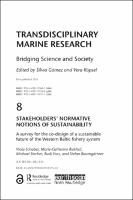Chapter 8 Stakeholders' normative notions of sustainability
A survey for the co-design of a sustainable future of the Western Baltic fishery system
| dc.contributor.author | Schaber, Viola | |
| dc.contributor.author | Riekhof, Marie-Catherine | |
| dc.contributor.author | Stecher, Michael | |
| dc.contributor.author | Voss, Rudi | |
| dc.contributor.author | Baumgärtner, Stefan | |
| dc.date.accessioned | 2022-12-15T15:27:04Z | |
| dc.date.available | 2022-12-15T15:27:04Z | |
| dc.date.issued | 2023 | |
| dc.identifier.uri | https://library.oapen.org/handle/20.500.12657/60257 | |
| dc.description.abstract | Chapter 8 = Many fisheries world-wide are not operating sustainably. Returning to sustainable levels is challenging as fisheries are embedded in complex marine social-ecological systems and bringing the system back to a path of sustainability will likely involve conflicts and tough choices. A first step towards a path of sustainability relates to understanding the (different) normative notions of sustainability held by different stakeholder groups. We use the (German) Western Baltic Sea as a case study to elicit these normative views. At a workshop with representatives of relevant stakeholder groups, we conducted a questionnaire-based survey. Questions were inspired by the stochastic-viability-conceptualization of strong ecological-economic sustainability under uncertainty. The survey focused on sustainability as a normative goal for fisheries management from a societal perspective. It returns quantitative results which can be directly utilized in fisheries management. We find considerable variation across as well as within stakeholder groups in their normative views on sustainability. Still, it seems to be consensus among all stakeholders that the different groups have legitimate claims to the Western Baltic Sea, providing common ground on how to 28 sustainably use the WBS, and a well-designed transdisciplinary approach with broad exchange between different stakeholders and science seems useful to steer the WBS into a sustainable future. | en_US |
| dc.language | English | en_US |
| dc.subject.classification | thema EDItEUR::R Earth Sciences, Geography, Environment, Planning::RN The environment::RNC Applied ecology | en_US |
| dc.subject.classification | thema EDItEUR::W Lifestyle, Hobbies and Leisure::WN Nature and the natural world: general interest::WNW The Earth: natural history: general interest | en_US |
| dc.subject.classification | thema EDItEUR::R Earth Sciences, Geography, Environment, Planning::RB Earth sciences::RBK Hydrology and the hydrosphere::RBKC Oceanography (seas and oceans) | en_US |
| dc.subject.classification | thema EDItEUR::T Technology, Engineering, Agriculture, Industrial processes::TQ Environmental science, engineering and technology | en_US |
| dc.subject.classification | thema EDItEUR::J Society and Social Sciences::JH Sociology and anthropology::JHB Sociology::JHBC Social research and statistics | en_US |
| dc.subject.other | ecology; oceanography; earth; environmental science | en_US |
| dc.title | Chapter 8 Stakeholders' normative notions of sustainability | en_US |
| dc.title.alternative | A survey for the co-design of a sustainable future of the Western Baltic fishery system | en_US |
| dc.type | chapter | |
| oapen.identifier.doi | 10.4324/9781003311171-10 | en_US |
| oapen.relation.isPublishedBy | 7b3c7b10-5b1e-40b3-860e-c6dd5197f0bb | en_US |
| oapen.relation.isPartOfBook | 5954ab82-b146-448c-aa63-480be94cbcd6 | en_US |
| oapen.relation.isFundedBy | 2af99390-8b5e-412c-be7b-2f15df488436 | en_US |
| oapen.relation.isbn | 9781032317601 | en_US |
| oapen.relation.isbn | 9781032317588 | en_US |
| oapen.imprint | Routledge | en_US |
| oapen.pages | 25 | en_US |

